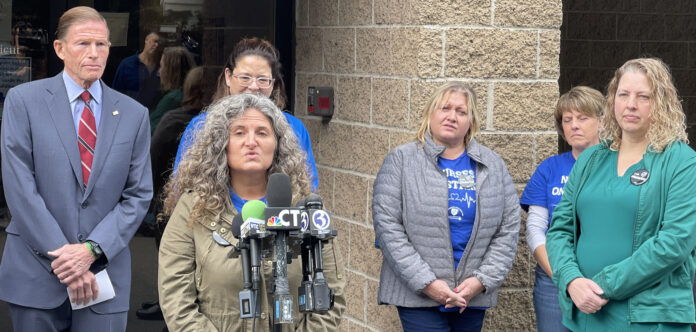When hospitals are faced with staffing-related challenges, executives and administrators often mandate that caregivers work beyond their scheduled shifts, jeopardizing their well-being and the safety of their patients. Last month, federal lawmakers re-introduced legislation seeking to end the use of this tactic and codify protections for nurses. The proposal would expand policies to acute care facilities across the country that union members here in Connecticut have secured as part of our “Code Red” campaign.
Although regulations limiting work hours have existed in various sectors (ex. aviation and trucking) for decades, the healthcare industry has been slower to implement such policies. The bipartisan bill Nurse Overtime and Patient Safety Act would remedy this and help reduce the frequency of dangerous patient care errors.
Click here for national reporting on the legislation’s re-introduction.
Steps to restrict mandatory overtime for nurses have been taken in 17 other states. Members of AFT Connecticut-affiliated local unions, through collective bargaining and legislative advocacy, have achieved safer health facility staffing that includes restrictions on mandatory overtime (OT).
The issue of mandatory overtime was the number one reason that Andrea Riley, RN, (speaking, in photo, above) saw a mass exodus of nurses at Windham Community Memorial Hospital (WCMH) in Willimantic. The president of our affiliated Windham Federation of Professional Nurses led nearly 100 of her colleagues to prioritize safe care in their latest contract negotiations.
“Wages and benefits are usually a big deal, but mandatory overtime trumped those issues in our bargaining,” said Riley. “In our contract, management was supposed to come to leadership – before mandating a nurse [to work OT] – to find a solution to avoid the mandate, but that just wasn’t happening,” she said.
That’s why Riley and her fellow nurses took to the picket line over the practice more than a year ago.
Click here for reporting on the contract that nurses at WCMH secured following their strike.
Riley criticized the use of mandatory OT by hospitals and corporations to fill staffing holes, emphasizing that it should never be a daily practice. She noted that Connecticut’s recently improved safe patient limits law gives nurses a stronger voice in staffing committees, which is a crucial step forward.
“For far too long, the concerns of the nurse, the doctor, and the ancillary staff have been ignored. The more nurses speak up, the more doctors speak up, the more patient care technicians speak up, the more we will effect change,” she concluded.
Click here for our report on last year’s victory in securing a stronger safe patient limits law.
Sherri Dayton, APRN, AFT Connecticut’s healthcare vice president, emphasized the need for federal legislation, pointing out the challenges caregivers face in enforcing existing laws. The proposal aims to address this by imposing civil penalties on hospital operators for violations, ensuring the development and distribution of policies, and protecting nurses’ rights through whistleblower provisions.
“Many facilities have no problem breaking the law, especially if they feel like they’re not going to get caught,” said Dayton. “Or if they do get caught, and all they get is a slap on the wrist. Does it hurt their PR enough to make them care, or does it hurt their pocketbook enough?”
Dayton acknowledged the uphill battle against well-funded hospital associations and their lobbyists but stressed the importance of federal legislation with enforceable policies. She highlighted the need for strong language in contracts, laws to eliminate potential loopholes, vigilant oversight and penalties that genuinely impact health networks’ bottom line.
Click here for reporting on the safe patient limits provisions signed into law by Connecticut’s governor.
Despite the progress made in Connecticut, Dayton pointed out the ongoing fight against corporate interests. While federal legislation would add substantial pressure, she emphasized the importance of staying vigilant and being proactive.
“We would not have been able to get this legislation passed if AFT Connecticut had not put a lot of time and effort into getting union people to run for office. And then getting out the vote to get them elected,” she added.
As the struggle continues at the national level, Dayton expressed pride in our union’s accomplishments and a commitment to ensuring that healthcare professionals are “at the forefront of positive change.”
“There’s always going to be a fight, but it feels good to have some wins,” she concluded.
Click here for our statewide vice president’s recent commentary celebrating safer working conditions for health professionals.
Editor’s note: includes contributions by Adrienne Coles, AFT



